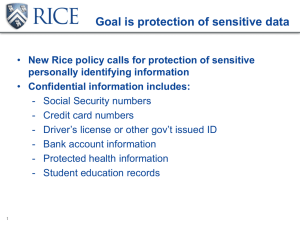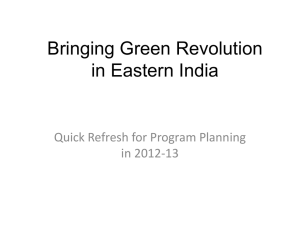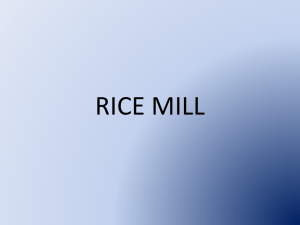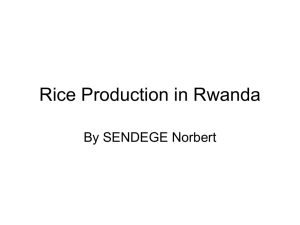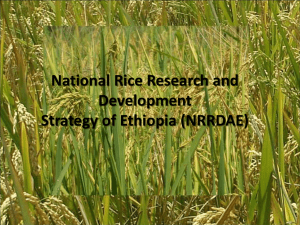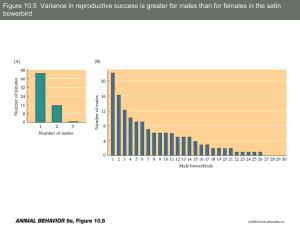Joint Secretary (Crops) during Kharif Campaign, 2011
advertisement
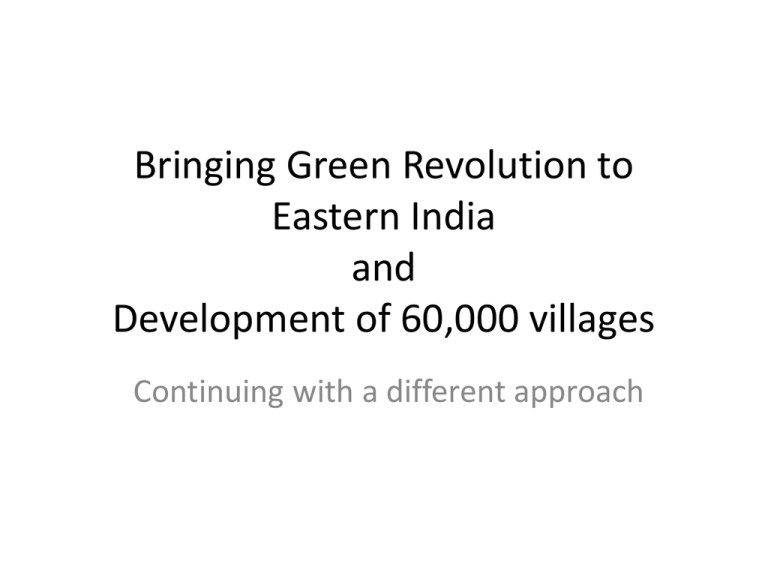
Bringing Green Revolution to Eastern India and Development of 60,000 villages Continuing with a different approach Rice Area affected by different stresses in eastern India (lakh ha) Salinity/Sodicity Flash Flood prone Drought Prone Coastal Inland Assam 8.0 2 Nil Nil Bihar 11.0 10 Nil 1.5 Jharkhand Nil 8.2 Nil Nil Chhattisgrah Nil 27.3 Nil Nil Orissa 11.6 12.6 1.5 Nil U.P 9.3 13.1 Nil 6 West Bengal 10.3 14.6 4.4 Nil 50.2 87.8 5.9 7.5 74 138.2 9.6 20.4 2/3rd 2/3rd 2/3rd 1/3rd States Total Region Total Rice Rainfed rice production is low and unstable mainly due to abiotic stresses Strategy • Promote stress tolerant varieties – Submergence tolerant • Swarna-Sub1 : Assam, UP, Bihar, WB, Orissa • Samba Mahsuri-Sub1 : UP, • IR 64-Sub1 : UP, Orissa, WB – Drought tolerant • Sahbhagi dhan : UP, Bihar, Orissa, Jharkhand and Chhatishgarh – Salinity tolerant • CSR-36 : UP & Bihar • Promote recommended package of practices suitable for different rice ecologies – – – – Upland rice Rainfed Low land rice Rainfed Deep water rice Irrigated rice Program • Technology promotion in compact blocks of 1000 hectares – Rice ecology specific technologies • Emphasis on line sowing/transplantation, land preparation – Hybrid rice promotion – Promotion of resource conservation technologies for wheat crop – Involvement of Progressive farmers • Asset building – Water source development • Shallow tube wells • Borewells and dugwells – Water pump sets – Zero till seed drills • Site specific local needs • Priority to Non NFSM Districts Financial allocation Wheat units 12% Site specific Needs 18% Asset building 18% Rice Units 52% STW 9% Pump sets 1% Bore wells/Dug wells 7% Zero Till Seed Drill 1% Target demonstration units Rainfed Low land Rice State Assam Bihar Chhattisgarh Jharkhand Orissa Eastern UP West Bengal Total Irrigated Rice Rainfed Shallow Upland Low land Medium Deep Water rice Rice Water Rice Rice 5 7 6 4 2 10 4 5 Hybrid Rice 2 9 Total Rice Wheat 2 26 5 35 22 HYV 7 26 0 0 5 3 41 4 8 5 12 0 10 0 1 3 8 2 5 14 44 3 6 5 2 22 13 51 97 7 36 12 78 12 37 2 14 15 64 10 40 58 269 3 122 Physical Targets Demonstrations, 391 Pump sets, 4200 Bore wells/Dug wells, 9000 Zero Till Seed Drill, 2000 Rice units, 269 Shallow Tube wells, 29500 Wheat Units, 122 Technology components - CRRI Activity Rainfed Upland Rice Rainfed Low land rice Shallow Lowland (0-15cm) Medium Deep Water (25-50 cm) Irrigated Rice Traditional Hybrid Rice Deep Ploughing and Land Preparation 1500 1500 1500 Deep Water (50100cm) 1500 Seed Direct Seeding (Line sowing by drum seeder) /Transplanting/seed drills Seed Treatment Zinc Boron Weed management Plant Protection Honorarium Staff – 1 per unit @ 1000/month*6 Mobility Staff Honorarium Farmer – 10 per unit* as above Mobility Farmer Provision of Drum Seeder Travel cost for KVK scientist/State officials/GOI officers. Total 2000 1500 2000 1500 2000 1500 2000 1500 1000 1500 2000 1500 120 875 275 640 700 6 6 60 60 70 100 120 875 275 640 700 6 6 60 60 70 100 105 875 275 640 700 6 6 60 60 70 100 105 875 275 0 700 6 6 60 60 70 100 60 875 275 640 700 6 6 60 60 70 100 25 875 275 640 700 6 6 60 60 70 100 7912 7912 7897 7257 6852 7817 1500 1500 Due importance to administration of programs for quality outcome Technology components of wheat units Activity Provision of seed Sowing Operation Seed Treatment and Cost per hectare (Rs.) 2000 1000 150 Weedicide 618 Staff cost/Hand Holding : Honorarium Mobility 6 6 Progressive farmers Honorarium Mobility 60 60 Travel cost for KVK scientist/State officials/GOI officers Total 100 4000 Remarks Seed Rate of 100kg/ha On Custom Hiring Basis Raxil/Vitavex/Bavistin as per recommendations of SAU/ICAR Isoproton or any other weeicide as per recommendations of SAU One staff for 1000 ha and he will be paid Rs.1000 as honorarium and Rs.1000 per month for Mobility for a period of six months . It comes out to be Rs. 12 per ha for one staff for one paddy season Progressive Farmer Cost:: One progressive farmer for every 100 hectare will be paid Rs 1000 as honorarium and Rs.1000 per month for Mobility for a period of six months . It comes out to be Rs. 120 per ha for one farmer for one paddy season For meeting the POL/TA/DA of KVK Scientists Timelines for Kharif Season Activity Preparation of District wise and Component wise Action Plan including site specific activities Identification of village clusters and Beneficiaries Identification of Progressive Farmers Land preparation and deep ploughing work planning Supply tie ups for seeds, farm machines, nutrients, seed treatment material and plant protection chemicals Approval of Action Plan by SLSCs Release of 1st installment of allocated funds to States Execution of pre sowing works Pre positioning of the inputs planned April Work plan by CRRI for monitoring of components Planning for mobility of the KVK and ATMA officials SLMT Meeting 15th Apr 30th Apr 28th May 25th Mar to 6th Apr 1st to 20th 10th Apr 20th Apr June - - 27th 15th to 30th Apr 15th May 1st May to 30th June 15th June 30th 30th Important Milestones Bouquet of programs DEVELOPMENT OF 60,000 PULSES VILLAGES IN RAINFED AREAS Program • Farm pond construction – New Farm ponds – Plastic Lining of old farm ponds • Additional A3P units – More units of same five crops – New pulses crops • Institutional Development – SFAC led creation of farmer producer organization Targets Physical • 15000 new Farm Ponds • Plastic lining for 15000 Farm ponds • 174 additional units of A3P – e pest surveillance through Master Trainers, Assigned Staff, Scout Farmers • 150 Farmer Producer Organizations Financial M&E, 300 FPOs, 2700 A3P, 9000 Farm Ponds, 18000 Farm pond program • Financial norms of NHM • Farm pond size as per technical estimates and the subsidy amount to be utilized • Plastic lining at 50 % of the cost subject to ceiling of 20,000 rupees • 30 % of the total number of constructions to be completed by June 2011 • Cluster approach suggested – For ease of mobilization machinery – For creating visible impact • Procedure illustrated in model guidelines as experienced in Maharashtra • Plastic lining only as per the technical advice • Payment of construction and laying of plastic lining to be made to farmers directly A3P units • Seed minikits and other critical inputs to be supplied by the States • Static pest surveillance by the progressive farmers on 2 to 3 fields • Training through NCIPM to the Master Trainers and in turn to the assigned agriculture officers • Honoraria to the progressive farmer and the agriculture officer interacting weekly with the progressive farmer • Mobility charges to be paid only after getting data sheets and the digital images of the crop health Timelines for Kharif season Activity Preparation of District wise, component wise Action Plan Village & beneficiary Identification for all Interventions Outsourcing of work executing agency Execution of the farm pond including lining Finalization of Suppliers of Agricultural Inputs and destination/location specific plan Pre-positioning of gypsum, micro-nutrients, Rhizobium culture, PSB, fungicides for seed treatment Pre-positioning of minikits of pigeon pea Prepositioning of minkits of Moong & Blackgram Approval of Action Plan by SLSC Release of funds to states Release of 1st Installment (50%) to beneficiary Monitoring of Works by State Release of final installment for completed works April 20th March to 6th April 1st to 20th April 2nd to 20th April May June - - 10th May to 30th June 1st to 15th 1st to 10th 15th to 20th April 20th to 25th 15th to 30th April 1st -15th 10th May to 30th June 15th to 20th 20th to 25th 25th to 30th June Important milestones Farmer producer organizations • MD, SFAC to present To conclude • Programs are focused on achieving exact physical deliverables • Involvement of KVKs, ICAR Scientists, CRRI and SAU scientists ensured for better monitoring • Need to designate senior officer in the State Directorates for exclusive attention • Key messages: Plan well, Forge Partnerships, Assign Responsibility, Monitor closely, Leave rest to the Nature Thank you!! Khullar.m@nic.in


